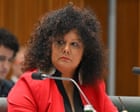
In a display of unity, the Labor and Green parties have come together to voice their concern over recent events in the Australian Senate. The catalyst for this convergence was a controversial decision by One Nation senators, who turned their backs during parliament’s traditional acknowledgment of country statements. These actions, considered by many as disrespectful, have drawn significant attention and sparked a broader conversation about respect and reconciliation.
At the heart of these discussions was Indigenous Affairs Minister Malarndirri McCarthy. Speaking with composed conviction, McCarthy described the actions of the One Nation senators as “incredibly childish” and, more importantly, “hurtful” to the process of fostering understanding and healing between Indigenous and non-Indigenous Australians. As someone deeply invested in promoting dialogue and mutual respect, McCarthy emphasized the need for continued acknowledgment of country statements as a mark of respect for the Indigenous custodians of the land.
The solidarity seen in the chamber was palpable as Labor’s government Senate leader, Penny Wong, and Greens leader, Larissa Waters, joined McCarthy in their critique of One Nation’s actions. Their statements focused on the importance of these acknowledgments as a positive step in Australia’s journey toward reconciliation. Both leaders reinforced the view that the acts of turning their backs during these statements only serve to undermine progress and unity.
Pauline Hanson, leader of One Nation, stood firm in her position, prompting reactions across various political and social spectrums. While Hanson’s actions were deemed by some as a political statement, others viewed them as exacerbating divisions. This situation highlights the challenges and complexities inherent in discussions about national identity, respect, and reconciliation in a multicultural society.
The acknowledgment of country statements are more than mere formalities; they represent a significant symbol of recognition and respect for Australia’s Indigenous peoples, acknowledging their enduring connection to the land. Such acknowledgments have become a fundamental part of official gatherings, reflecting a national shift toward inclusiveness and acknowledgment of past injustices.
In the wake of these events, the overarching message from the Labor and Greens parties is one of hope and perseverance. They called for a unified effort to maintain the integrity and spirit of acknowledgment of country statements, emphasizing that respect and understanding should guide the nation’s path forward. By fostering an environment where such values are upheld, Australia continues to build a future that embraces diversity and promotes reconciliation.
This episode in the Senate serves as a reminder of the importance of mindful dialogue and the power of unified voices in promoting positive change. The echo of these discussions extends beyond the walls of parliament, inviting all Australians to engage in deeper reflection and action toward a more inclusive and respectful society.
Source: {link}
